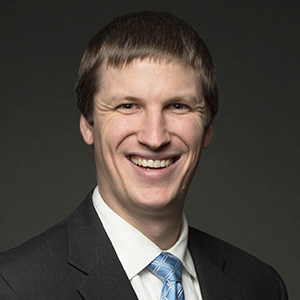is an associate in Merchant & Gould’s Minneapolis office, Joe has extensive experience in complex patent, copyright, trademark, and trade secret matters as well as work in appellate and post grant proceedings. Joe focuses on identifying the critical aspects of the case that may drive a favorable settlement or be persuasive to a trial fact finder.
Joseph is a summa cum laude graduate of the University of St. Thomas with a degree in biology. Following undergrad, Joseph received a doctorate in biology and biomedical science with an emphasis in neurosciences from Washington University in St. Louis. While there, he used functional magnetic resonance imaging to investigate how groups of regions of the human brain, known as networks, manifest task instructions during tasks. His attention-focused research on adults may be used to help diagnose attention disorders such as attention deficit hyperactivity disorder and Tourette syndrome in children.
Joseph graduated summa cum laude and salutatorian from Mitchell Hamline School of Law. At Mitchell Hamline, he was a staff member on the Cybaris® Intellectual Property Law Review, publishing an article entitled “Inter Partes Review: A Multi-Method Comparison for Challenging Patent Validity,” and was later an executive editor for the journal.
Joe has been honored as a Minnesota Lawyer Attorney of the Year, Best Lawyers: Ones to Watch, and Minnesota Monthly’s Best Lawyers in Minnesota.
Originally from Milwaukee, Wisconsin, Joseph was active in soccer, high school band, and the Boy Scouts of America. In his free time now, Joseph enjoys participating in and watching a variety of sports and being outdoors and on the lake fishing and boating. He also likes to cook and bake when time allows.

Recent Articles by Joseph Dubis
The proposed rule would adopt the narrower standard articulated by the Federal Circuit in Phillips v. AWH Corp., where the “words of a claim are generally given their ordinary and customary meaning,” which is “the meaning that the term would have to a person of ordinary skill in the art in question at the time of the invention.” 415 F.3d 1303, 1312-13 (Fed. Cir. 2005). Additionally, under the proposed approach, the Patent Office would construe patent claims and proposed claims based on the record of AIA proceeding, and take into account the claim language, specification, and prosecution history. In response to the Patent Office’s notice of proposed rulemaking, the New York Intellectual Property Law Association (NYIPLA) recently submitted comments endorsing the Patent Office’s proposed changes.

![[IPWatchdog Logo]](https://ipwatchdog.com/wp-content/themes/IPWatchdog%20-%202023/assets/images/temp/logo-small@2x.png)

